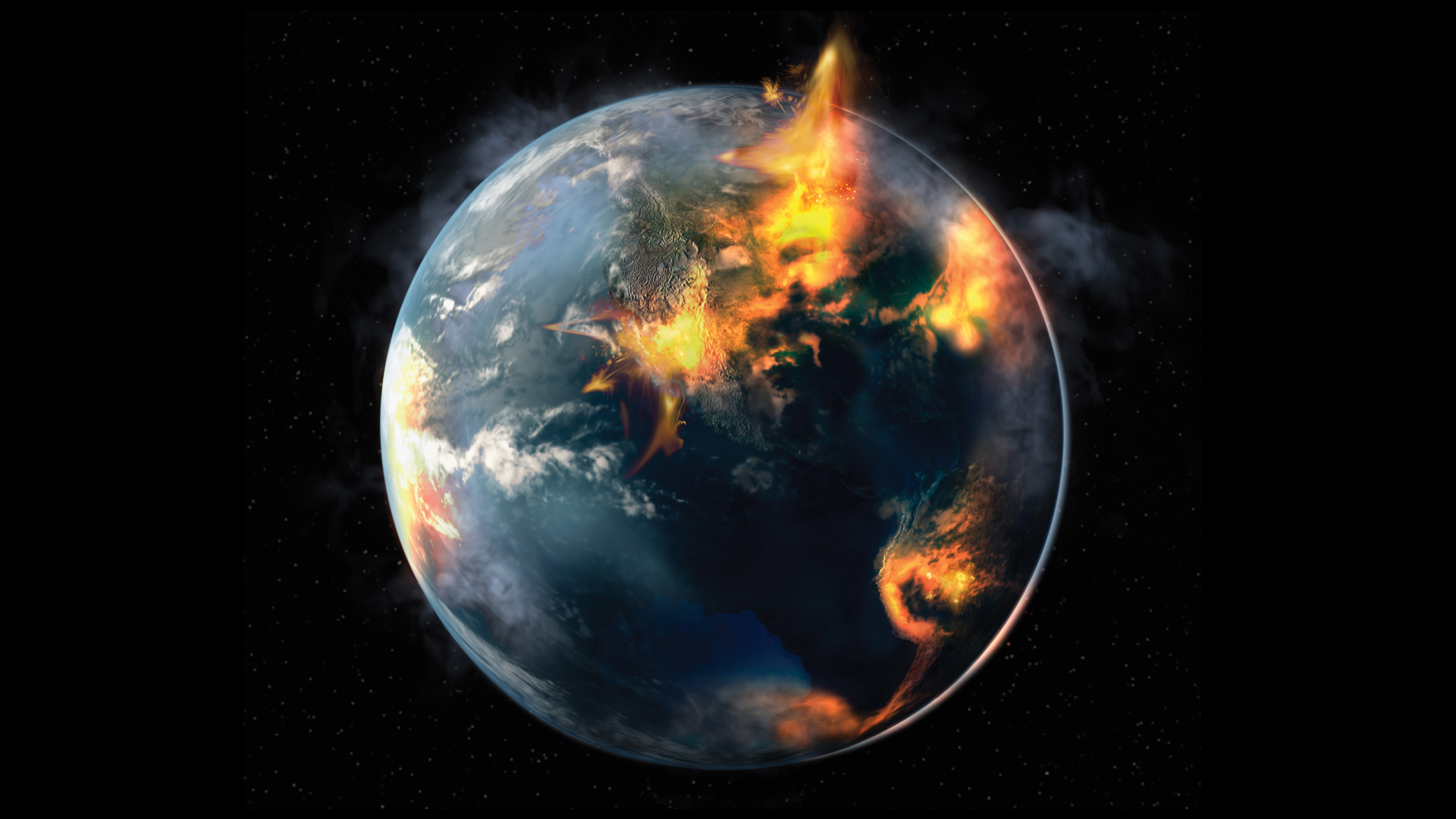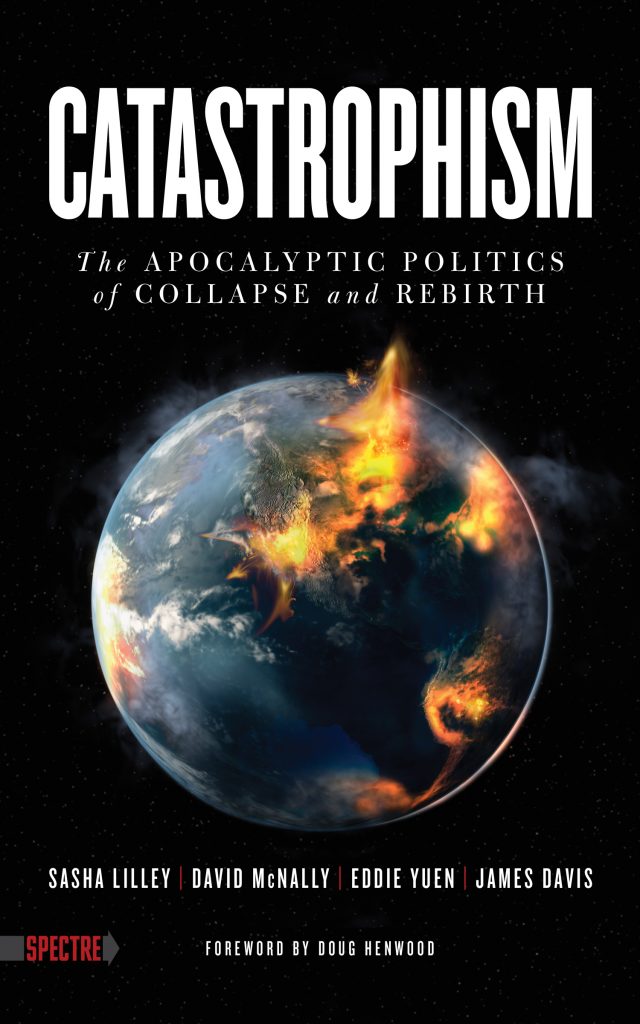by Robert S. Eshelman
The Brooklyn Rail
March 2013
The Bankruptcy of Doom and Gloom
When University of Texas journalism professor Robert Jensen claimed in a recent Truthout op-ed, “We are all apocalyptic now, or at least we should be, if we are rational,” his aim was to alert his readers to a litany of ecological transformations brought about by humans: aquifer and topsoil depletion, aquatic “dead zones,” rapid extinction of the earth’s flora and fauna, and more frequent and intense extreme weather events. It’s a daunting list of crises, but speaking apocalyptically, says Jensen, “can focus our attention on ecological realities and on the unjust and unsustainable human systems that have brought us to this point.”
Jensen hews closely to the long American tradition of fire and brimstone oratory and the promise that on the other side of disaster lies paradise. He acknowledges such tendencies in his essay. But, he says, his form of apocalypticism parts ways with the Book of Revelation because it is based on peer-reviewed science, rather than religious narrative.
Yet how does echoing Biblical narratives about a new society rising from the wreckage of the old transform America’s hapless consumers, disenfranchised poor, and duped middle classes into agents of a more just world? Moreover, are apocalyptic political frames politically biased—that is, does framing world events in catastrophic terms benefit the political right or the left?
Secular predictions about the demise of one form of unjust social organization and the imminent arrival of another, more socially just one, certainly have been commonplace on the political left and within the environmental movement in the past several years. Catastrophists assume that as conditions get worse the likelihood that they will get better improves. In their view, wholesale social or financial collapse is the disease but also the cure.
Sasha Lilley, for one, disputes the catastrophist teleology. In her introduction of Catastrophism: The Apocalyptic Politics of Collapse and Rebirth (PM Press, 2012), the Berkeley-based writer and radio host argues that an “awareness of the scale or severity of catastrophe does not ineluctably steer one down the path of radical politics.” Catastrophism, in other words, hinders, rather than hastens, political action on climate change or the development of a new economic system. Not only does it paralyze, says Lilley and her co-authors, but worse yet, it often echoes the right’s theories of population bubbles—i.e. that the increasing number of poor in the darker nations of the global South are to blame, rather than carbon-intensive lifestyles of people in richer nations.
Crises, whether economic or ecological, rarely produce the profound change promised by the catastrophists. Lilley observes that while the New Deal did, in fact, originate in response to the Great Depression, the great American strike waves of 1898 to 1904 and 1916 to 1920 occurred during periods of relative economic prosperity. Both periods of labor militancy led to large wage increases and improvements in working conditions. During later periods of economic contraction, elites blamed the troubles on the rising power of workers. The recession of the 1970s ushered in the economic policies of Paul Volcker and, across the Atlantic, those of Margaret Thatcher.
Conversely, China’s economic growth in recent years has consistently been above 9 percent, even during the global recession. Yet amidst the generalized economic prosperity that has improved the economic conditions of millions of poor Chinese, wildcat labor strikes break out on a daily basis, bringing to a grinding halt production of all sorts of consumer goods driving international trade. As things get better economically, workers’ power improves.
A new financial order has not emerged from the human misery left in the wake of millions of jobs lost and millions of homes foreclosed upon in the U.S. Since the collapse, Wall Street has rebounded. Banks now hold two trillion dollars in cash reserves, and the top investment firms are once again issuing bonuses on a scale rivaling those of the years prior to the Great Recession. (“We actually benefit from downturns,” JP Morgan Chase’s Jamie Dimon boasted the other day.) When unemployment goes up, employers often find the leverage to discipline workers, fearing that slightest of workplace violations could mean lost wages, fewer scheduled hours, or termination. It doesn’t take a Foucault to see the myriad methods for discreet control that become available to the bosses when an economy is in free fall.
The Occupy movement reminded laid off workers and anyone who defaulted on a mortgage that they weren’t at fault but were the outcome of an economic model that works in opposition to their interests. Occupy turned private struggle into shared, public debate. Individual voices—and stories of hardship—were amplified by the power of a collective, antagonistic body. It wasn’t narratives of catastrophic collapse and rebirth that brought people to encampments across the country but the fact that for a moment—one that lasted much too briefly—the commonsensical idea that free markets equal free people was shattered.
Discussion of climate change is where catastrophism has taken hold the most. Scores of environmental writers, Jensen among them, are merchants in the commodity of doom and gloom. Let’s be clear: climate change most certainly represents an unprecedented ecological threat. Jensen’s list of changes to the oceans and atmosphere brought about by human industrial, agricultural, or consumptive patterns, makes the problems abundantly clear.
But as Eddie Yuen says in his essay in Catastrophism, “[E]ven when dire environmental prognostications are accurate … it is often the case that knowledge of ‘the facts’ does not lead to an increase in political engagement.” And, he continues, prophesies of collapse elide the discussion of the everyday catastrophes that climate change is already delivering to Indian farmers, Mexican fisher folk, coastal dwellers the world over, and even to meatpackers in Plainview, Texas, where 2,200 Cargill employees were laid off because there are not enough cows to keep their plant operating.
For Jensen, “To think apocalyptically is not to give up on ourselves, but only to give up on the arrogant stories—religious and secular—that we modern humans have been telling about ourselves.” By contrast, Catastrophism’s authors say that such a view amounts to surrender. It’s a politics of despair, rather than ambition. “[It’s] one way,” says James Davis in Catastrophism, “to shift the focus from the essential questions of public policy, democracy, equality, access to education and health, environment, etc. and onto abstractions about civilization, culture, and threats to the prevailing social order that promises instability and worse.” The doomsayers, you might say, will continue to get what they wish for.
Back to Sasha Lilley’s Author Page | Back to David McNally’s Author Page | Back to Eddie Yuen’s Author Page | Back to James Davis’s Author Page







